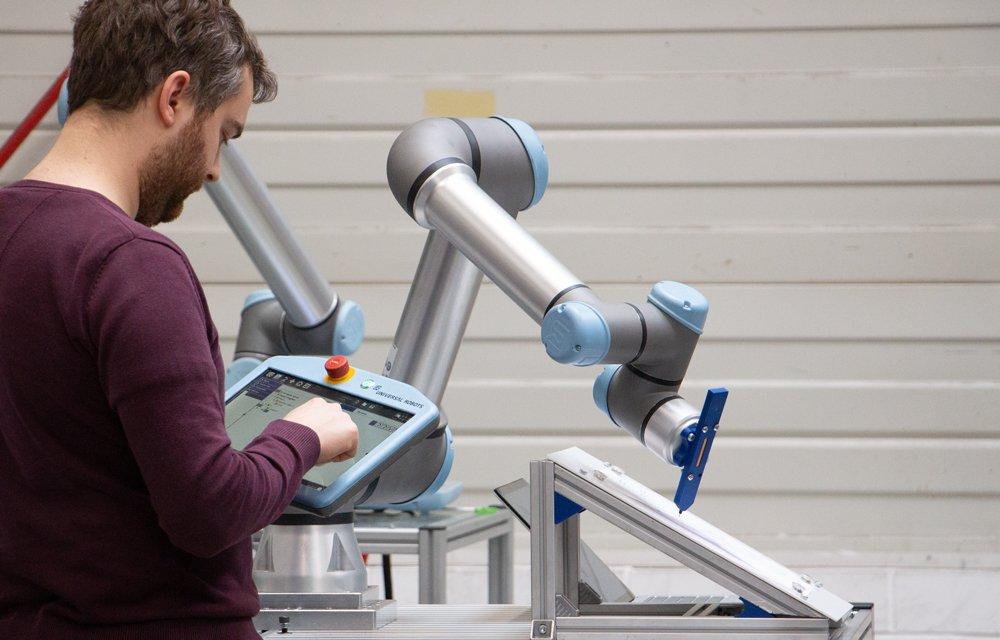Automation with artificial intelligence and cobots
Even though the number of vacancies in Germany has fallen in recent years, the figure remains at a high level. The shortage of skilled workers is omnipresent in almost all sectors and is an increasingly difficult challenge to overcome, especially for small and medium-sized companies. Demographic change will lead to a further decline in the number of people of working age in the coming years and thus to a worsening of the situation. The use of collaborative robots (cobots) in conjunction with artificial intelligence (AI) offers a promising solution to these challenges. This can make production processes more efficient and counteract the shortage of skilled workers.
AI and robotics in production
In 2025, the IPH – Institut für Integrierte Produktion Hannover gGmbH will demonstrate how artificial intelligence and robotics can be combined to automate production processes. The aim is to react to unforeseen events on the one hand and, on the other, to achieve this with lower personnel costs.
Against the backdrop of labor market developments, it is therefore advisable for companies to start thinking about automation and the use of AI now. This is an elementary building block for securing Germany and regions such as Hanover as business locations in the long term.
Cobots: human-robot collaboration
Collaborating robots, known as cobots, are an innovative approach. Unlike conventional industrial robots, they can work directly with humans. Safety guards are not necessary as they have special sensors and protective mechanisms that prevent collisions. This makes it clear that cobots are not intended to replace human workers, but to provide them with targeted support and thus relieve their workload.
One example of this is an IPH exhibit that uses innovative image processing algorithms. An image unknown to the cobot is captured and pre-processed so that the cobot can then draw it in detail. The AI processes the image and automatically creates a movement instruction for the cobot without a human having to program the process. This technology can be transferred to various production areas, such as automated welding. The targeted use of AI and cobots offers companies significant potential.
Research and prospects
IPH has extensive experience in the field of artificial intelligence from numerous consulting and research projects. These include AI-based data analysis of medical data and AI-supported order verification. IPH is also involved in the European research project “AIMS5.0”, which is further developing AI in the manufacturing industry and setting the course for Industry 5.0 in Europe. IPH engineers will be on hand at the stand to provide information on projects and welcome inquiries from research and industry. Visit IPH at the Hannover Messe 2025 in hall 16, stand F09: https://www.hannovermesse.de/…
The IPH – Institut für Integrierte Produktion Hannover gGmbH (which literally translates into Hannover institute of integrated production) is a service provider for production technology and was established in 1988 at the Leibniz University in Hannover .
The IPH offers research and development, consultation and qualification concerning the subjects of process technology, production automation and logistics. Its customers include companies from the sectors of tool and mould construction, machine and plant construction, aerospace and the automotive industry, electro industry and forging industry.
The business has its headquarters in the science and technology park – Science Area 30X in the northwest of Hannover and currently employs about 80 people, of which about 30 are scientific personnel.
IPH – Institut für Integrierte Produktion Hannover gemeinnützige GmbH
Hollerithallee 6
30419 Hannover
Telefon: +49 (511) 27976-0
Telefax: +49 (511) 27976-888
http://www.iph-hannover.de
Telefon: +49 (511) 27976-122
E-Mail: fliegner@iph-hannover.de
PR- & Marketing-Referentin
Telefon: +49 (511) 27976-116
E-Mail: reichert@iph-hannover.de
![]()

